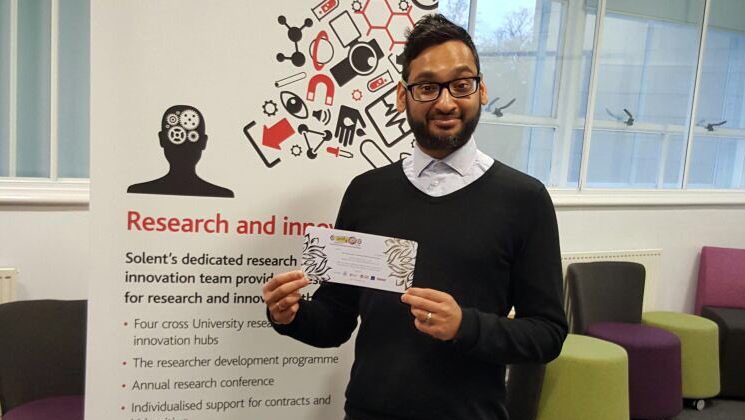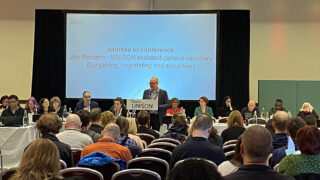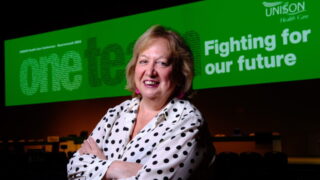Higher education member Bill Acharjee (above) works at Solent University in Southampton as a research governance officer, with the task of ensuring that students and academics maintain ethical standards while they conduct their research projects. He’s thoughtful, conscientious. And while working from home during the COVID-19 crisis, he has a very sobering thought.
“A world without universities would be tragic,” he says. “I just can’t comprehend it.”
But there’s a very real danger some may struggle to survive, Mr Acharjee feels, if the government continues to refuse to come to the aid of universities during the health crisis and its aftermath.
“I’ve read articles that suggest that due to the financial issues that lots of institutions are facing, we may see some universities going into administration. I think we just need some assurance from the government, for them to make a statement to say that they are committed to ensuring the best for the future of HE.”
UNISON and its HE members (see below) agree. Today the union launched its Don’t Fail our Future campaign, which is seeking urgent additional funding from the government that will enable universities to survive the devastating financial fallout of the pandemic.
Many HE institutions were already in a precarious position due to competition, rising costs and concern around the potential consequences of Brexit. They receive a substantial proportion of their funding based on student numbers – and are now likely to be massively short of both home and international students for this coming academic year, including those who decide that distance learning – potentially the only option – is not worth the fees.
And yet so far the government has refused to provide any new funds. The treasury has agreed some advance on student fees, but otherwise has instructed universities to take out loans.

Don’t Fail our Future highlights the value of higher education to the country – for staff, students, public services and the economy.
Ruth Levin, UNISON’s senior national officer for higher education, said: “Universities are one of the UK’s biggest success stories, providing a world-class education and high quality research. Their workforce of nearly half a million people includes the skilled and dedicated support staff UNISON is proud to represent.
“Our members are the backbone of these institutions: cleaning campuses, fixing IT, running labs, preparing food, supporting students’ wellbeing and so much more. UNISON is campaigning for urgent funding to ensure high quality, accessible higher education is maintained and our members’ jobs are protected.”
Mr Acharjee, who’s the Black members officer for Southampton District branch, has been with Solent University for 12 years, the past four as the research governance officer. The role involves him working with a panel of academics to ensure that research projects adhere to industry standards and regulations regarding their ethical approach.
Up to 3,000 ethics application forms come his way each academic year, raising such diverse issues as whether a survey of people’s responses to horror films risks respondents feeling overly scared or vulnerable, pensioners being quizzed about their wartime experiences don’t become distressed, and that a student researching online terrorism keeps his or her data secure.
“If I wasn’t in post, potentially you would have academics allowing their students to run wild. We have to safeguard our students – that comes first – as well as any participants they engage with.” He laughs. “And without my role, to advise and guide staff as well as students, there could be anarchy.”
I’m still one of the lucky ones at the moment who has a job
Reflecting on the plight that his sector currently finds itself, Mr Acharjee says: “The value of HE is huge, in terms of helping to instil those higher level skills in students that are required in an ever-changing employment landscape.
“And I believe that individuals who engage with university courses have a better understanding of the world. You think the world is black and white, then you go to university and you see the other shades.”
He sees another value in ‘widening participation’ universities such as his own, whose students are traditionally from working-class families – often the first in their families to take degrees. “That’s so important, because it helps those students to enhance their social capital and compete against students from more privileged backgrounds. If you take that opportunity away from them, it could be devastating.”
And so he believes that the need for a bail-out is essential.
“Over the last few years we’ve been haemorrhaging good, talented professionals. People are being made redundant or leaving because of the stress caused by the shortage of funds. We’re all expected to do much more for less.
“I’m still one of the lucky ones at the moment who has a job, but I’m aware there are of lots of colleagues throughout the country – really good, highly qualified staff of great experience, who are sadly losing their jobs. And the pandemic is not going to help at all.”
Marina Granados, cleaning supervisor for a private contractor, University of Arts London
“My job is to supervise the cleanliness of the university every morning, to ensure that everything is clean by 8 am. In this way I contribute so that the office staff, teachers and students can work and study in a clean space with good hygiene.
“I think that cleanliness inspires neatness and imparts respect. It also creates a good image of the site. Besides, with good hygiene many diseases are prevented. Cleaning staff are indispensable. If nobody covered my work it would be a disaster for everyone in the university, because it is impossible to work in a dirty place.”

Tom Riley (above), central student services, Leeds University
“I work in the central student services of a large university in the north of England. Universities are large complex organisations, and it is my job to put students in contact with those who can help them with issues they are facing.
“A typical day will have queries about lost student ID cards, exam support, accommodation, visas, and accessing financial support.
“In early 2020, we were one of the first services to become aware of the impact of coronavirus, as many students from China were unable to make fee payments and came to us for advice. Speaking about their situation, and their fears for their families, was an ominous sign of things to come.
“Without support staff, these pastoral and administrative responsibilities would fall on academic staff. This would impede their ability to teach the next generation of graduates. It would also impact the research going on in the UK, as our support allows academics to study climate change, effective business management and, of course, clinical research about coronavirus.”
Antonia Berelson, registered nurse, University of Brighton
“I am employed by the university to work as a practice nurse within their Eastbourne campus. The university has a partnership with a local GP surgery that means that all students who attend the university can register there.
“I work in the sister surgery that is set up within the student services building, running daily term-time clinics and supporting the GPs when they come to run their clinics there.
“I am available to the students either via appointment or drop in during term time. I run a catch-up clinic for students who may have incomplete vaccination status, which is vital as the student population are more at risk of Meningitis. I can also provide sexual health and contraception advice, liaising with the local sexual health team so I can give out condoms and offer chlamydia testing. I triage minor illnesses, referring them on to the GP as appropriate, or in some cases straight to hospital. I also find a large percentage of my appointments are mental health related, and support and refer as needed. I’m able to run health promotion events within the university, working with local services within the community.”






